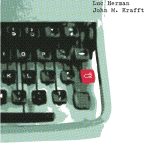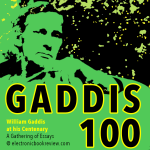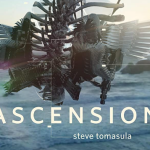fictions present
Writing in Flux
Little is know about the famously private Thomas Pynchon, but can we learn anything from an early manuscript of V.? Hanjo Berressem reviews Becoming Pynchon by Luc Herman and John M. Krafft.
Gaddis-Knowledge After the “Very Small Audience” Era: Introduction to the Special Issue on “William Gaddis at his Centenary”
Ali Chetwynd's introduction to the Gaddis centenary gathering on ebr.
Erroneous Assumptions: Steve Tomasula’s Ascension
Taking an ironic, Icarian twist on Steve Tomasula's Ascension, Stuart Moulthrop situates Tomasula's novel in a subterranean, encyclopedic lineage that includes print fictions like Joyce’s Ulysses, Dos Passos’ U.S.A. trilogy, Pynchon’s Gravity’s Rainbow, DeLillo’s Underworld, David Foster Wallace’s Infinite Jest, and Zadie Smith’s White Teeth – novels that are, as Edward Mendelson put it, “the products of an epoch in which the world's knowledge is larger than any one person can encompass.” It's an experimental lineage that is, arguably, one of the more noteworthy carryovers from print to digital literature; a genre that Moulthrop (2013) and his near contemporary Michael Joyce (2007) have termed the “novel of internet.”
Neocybernetic Posthumanism and the AI Imaginary: Artificial Communication in Kim Stanley Robinson’s Aurora
Bruce Clarke focuses transhumanism through the dialects of a neocybernetic systems theory (NST). As Clarke explores the dynamics of a NST, he outlines important components of the AI Imaginary—or, the theoretical and mediated discussions of intelligent technologies--in order to explore how machines, humans, and systems can work together. Specifically, he presents Kim Stanley Robinson’s novel Aurora (2015), as an exception to the AI Imaginary in its representation of “a solidarity that regathers rather than alienates human and machine beings.”
Digital Orihon (デジタル折り本): The (un)continuous shape of the novel.
Wright explores the digital manifestation of an orihon manuscript style for how it can expand how we think of the novel's form. He considers how digital versions of J.M. Coetzee's Diary of a Bad Year and his own print novella make use of the concept of the fold as identified in the orihon style.
In Conversation with Bertrand Gervais at the Heart of the Digital World
Dani Spinosa asks Bertrand Gervais about the place of digital literatures across Francophone and Anglophone Canada, the issue of genre and labelling in the field, and his work with NT2. Gervais here foregrounds the ground-breaking contributions of Québécois writers, artists, and scholars that are foundational to Canadian digital humanities and media studies across the country, and speaks to how important it is that digital publishing prioritize accessibility and evolution.
Introduction: Decoding Canadian Digital Poetics
Dani Spinosa and Lai-Tze Fan discuss the need for a Canadian digital poetics, as well as for an understanding of its past developments, present shifts, and future possibilities.
Delirium, Disruption and Death: On Stéphane Vanderhaeghe’s Charøgnards (Quidam éditeur, 2015).
Whilst reading Stéphane Vanderhaeghe’s dystopian fiction and touching on Bernard Stiegler's Age of Disruption, Greg Hainge explores the world that now reads us via a universal digitisation.
Genre Defining: Michael Lackey’s Conversations with Biographical Novelists
After a programmatic attempt to taxonomize the genre of biographical fiction, Lackey's actual interviews with the genre's representative authors tend to uphold the willfully untamable nature of fiction.
Image by Joanna Portelli
Our Struggle: Reading Karl Ove Knausgård’s Min Kamp
A roundtable discussion hosted by Karl Knausgaard's Alma Mater in Bergen, Norway.









